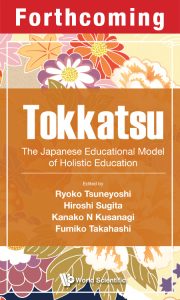We’re pleased to accounce our new book, which will be published from WorldScientific, Singapore very soon.
Tokkatsu
The Japanese Educational Model of Holistic Education
It is the research outcome of one of our research projects, “The 21st Century International Educational Models Project (Head: Ryoko Tsuneyoshi)”.
It is written primarily for those in the field of education outside Japan, about Tokkatsu, which is a shorthand for Tokubetsu Katsudo, which is the name of a school period but is also used symbolically to mean the Japanese holistic educational model. The book covers several educational activities, such as school cleaning, serving lunch, classroom discussion, etc. in the Japanese schools and explains the educational objectives, how they are situated within the curriculum, how the teachers and staffs collaboratively link the activities to the academic subjects and so on. There is also a chapter about the introduction of Tokkatsu in Egypt, (Tokkatsu +).
—from the website: https://www.worldscientific.com/worldscibooks/10.1142/10781
Though there has been much discussion on the academic aspects of Japanese education abroad (e.g., high scores on international tests, lesson study), there has been little information on the non-academic aspects of Japanese schooling. This non-academic aspect is called Tokkatsu (tokubetsu katsudo).
Unlike math and reading, Tokkatsu is not confined to a certain period, but extends throughout the school day and even after-school activities — such as school excursions. It includes classroom activities such as classroom discussions, morning and afternoon meetings that take place daily, cleaning and serving lunch, school events such as sports day, school excursions, student councils, and club activities. Such activities occur every single day, throughout one’s school years, from elementary school (actually, even kindergarten) to high school. They are, however, bound together by the common goals of the Tokkatsu framework.
This book is the foremost attempt to address a gap in English literature on Tokkatsu.


